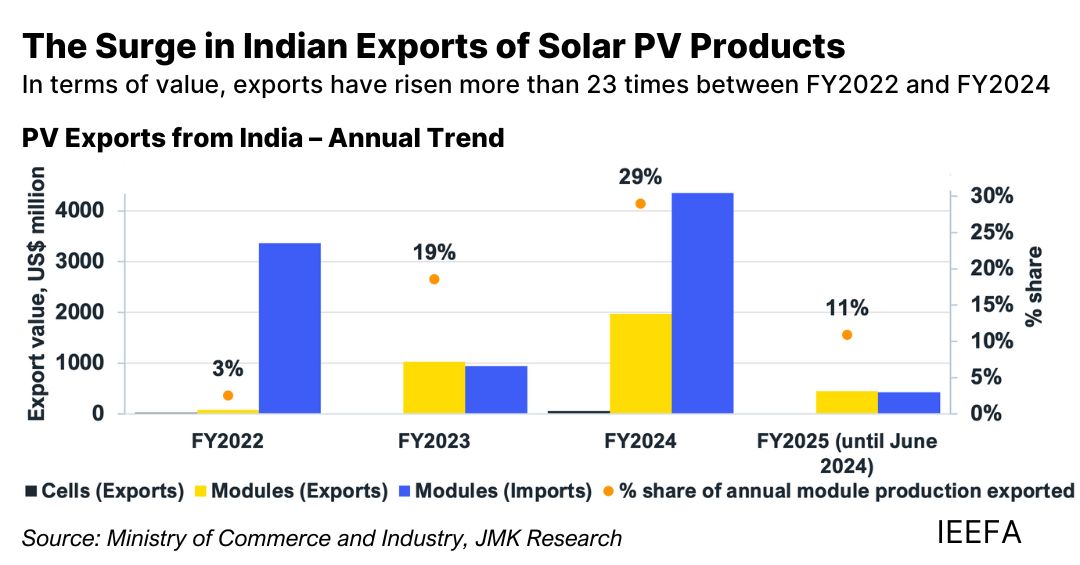Solar PV export value from India surged 23 times between FY2022 and FY2024

As Indian manufacturers continue to strengthen their foothold in global markets, particularly in the US, they must strike a balance between meeting international and domestic demand
Key Takeaways:
The US was a key export market for Indian solar photovoltaic (PV) modules, accounting for more than 97% of the country’s solar PV exports in both FY2023 and FY2024.
With the expiration of the Free Trade Agreement and an ongoing antidumping and countervailing duty investigation, India can potentially replace Southeast Asian countries to become the leading PV exporting country to the US.
While focussing on the export market, Indian manufacturers must also ensure adequate domestic supply, especially for market segments with smaller order sizes, such as distributed renewable energy, including residential rooftop solar.
India is making significant progress in transitioning from a net importer to a net exporter of solar photovoltaic (PV) products, with the export value rising 23 times to US$2 billion in the Fiscal Year (FY) 2024 from FY2022, states a new report by the Institute for Energy Economics and Financial Analysis (IEEFA) and JMK Research & Analytics.
Several factors have brought about this increase in exports. Some key reasons are the reduced demand for domestic PV modules following the delayed implementation of the Approved List of Models and Manufacturers, other countries considering India as a viable option for their “China Plus One” strategy, and domestic PV manufacturers looking to sell their products at a higher premium abroad, the report finds.
In terms of markets, the US has emerged as a key market for Indian solar PV exports. More than 97% of Indian solar PV exports went to the US in both FY2023 and FY2024.
“Focussing on the US market can benefit the Indian PV manufacturing ecosystem. The exposure to the US market will enable Indian PV manufacturers to attain economies of scale, ultimately enhancing their product quality and competitiveness,” says the report’s contributing author, Vibhuti Garg, Director – South Asia, IEEFA.
“But, to truly establish India as a global manufacturing hub in the long run, Indian PV manufacturers must focus on upstream backward integration. This will help India maintain its foothold in existing markets while unlocking untapped markets like Europe, Africa, Latin America, etc,” she adds.
At the same time, the report also notes that it is important for PV manufacturers in India to balance the needs of the growing export market with domestic availability.
“During periods of domestic supply shortage, certain distributed renewable energy segments, such as residential rooftop solar, could be affected due to their smaller order sizes. This can make it difficult for developers to secure enough supplies to execute their projects. The supply-demand gap also affects solar module prices, which is a critical factor for the price-sensitive residential rooftop solar segment,” says the report’s co-author, Jyoti Gulia, Founder, JMK Research.
The report estimates that annual module production by Indian solar PV manufacturers in FY2025 and FY2026 will likely be 28 gigawatts (GW) and 35GW, respectively.
“After accounting for exports, the resultant supply by Indian PV manufacturers in the next two years will be only 21GW and 25GW, respectively, which is less than the requirement of approximately 30GW per annum to meet India’s 2030 renewable energy target,” says the report’s co-author, Prabhakar Sharma, Senior Consultant, JMK Research.
The report highlights that adopting a multi-pronged export-oriented approach while balancing domestic demand would augur well for India’s climate goals.
“India is on the cusp of an energy transition revolution, with solar technology being a critical enabler. Ensuring that India meets its domestic demand while simultaneously establishing itself as a viable alternative to Chinese-origin PV products will contribute significantly to achieving the country’s renewable energy goals,” says Garg.
Read the report: Indian Solar PV Exports Surging
Media contact: Prionka Jha ([email protected]); +91 9818884854
Author contacts: Prabhakar Sharma ([email protected]); Jyoti Gulia ([email protected]); Vibhuti Garg ([email protected])
About JMK Research & Analytics: JMK Research & Analytics provides research and advisory services to Indian and international clients across renewable energy, electric mobility and the battery storage market. (www.jmkresearch.com)
About IEEFA: The Institute for Energy Economics and Financial Analysis (IEEFA) examines issues related to energy markets, trends and policies. The Institute’s mission is to accelerate the transition to a diverse, sustainable and profitable energy economy. (ieefa.org)















